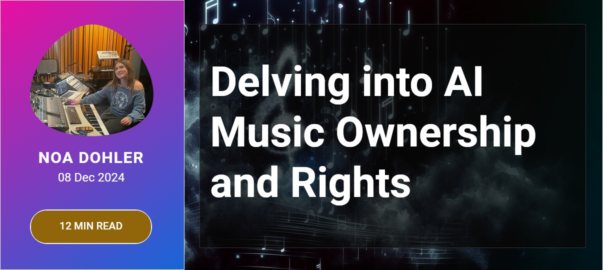AI Music Tech revolutionizes creativity, but who owns it?
In the ever-evolving landscape of music technology, AI has emerged as both a groundbreaking tool and a source of heated debate. As we’ve explored in our discussion about the legal implications of AI in music, the intersection of artificial intelligence and musical creation raises profound questions about ownership, creativity, and the future of artistic expression.
As a composer who’s witnessed the AI revolution firsthand, I remember my first encounter with AI-generated harmonies. The algorithm suggested a chord progression that I’d never considered, leading to a collaborative piece that blended human emotion with machine precision. It was both thrilling and unsettling.
The Evolution of AI in Music Creation
AI Music Tech has fundamentally transformed the landscape of music creation, with algorithms now capable of generating complex compositions in milliseconds. According to World Economic Forum research, the technology’s ability to analyze and replicate musical patterns has reached unprecedented levels. The integration of machine learning has enabled AI systems to understand musical theory, composition techniques, and even emotional elements of music.
The impact of this transformation extends beyond mere composition. AI algorithms can now generate original melodies, harmonies, and complete arrangements across various genres. This technological advancement has democratized music creation, allowing individuals without formal musical training to explore their creative potential.
However, this revolution brings both opportunities and challenges. While AI music tech enhances creative possibilities, it also raises questions about the authenticity of AI-generated compositions. The technology’s ability to analyze and learn from existing music catalogs has sparked debates about originality and the role of human creativity in the digital age.
Legal Frameworks and AI Music Rights
The intersection of intellectual property law and AI Music Tech presents unprecedented challenges for the legal system. According to legal experts, traditional copyright frameworks struggle to accommodate AI-generated content. The fundamental question of whether AI-created music can be copyrighted remains contentious.
Current legislation primarily protects human authorship, creating a gray area for AI-generated content. Many jurisdictions require human creativity as a prerequisite for copyright protection, leaving AI-created works in legal limbo. This uncertainty affects everyone from individual creators to major music publishers.
The global response to these challenges varies significantly. While some countries are developing new frameworks to address AI-generated content, others maintain traditional copyright approaches. This disparity creates complications for international music distribution and licensing, particularly in the digital age.
Ethical Dimensions of AI Music Creation
AI Music Tech raises profound ethical questions about authenticity and artistic integrity. According to SOCAN’s guidelines, protecting creators’ rights while fostering innovation remains crucial. The technology’s ability to mimic artistic styles has sparked debates about cultural appropriation and creative authenticity.
The impact on human musicians and composers cannot be overlooked. While AI enhances creative possibilities, it also raises concerns about job displacement and the devaluation of human artistry. Many artists worry about maintaining their unique creative voice in an AI-dominated landscape.
Transparency in AI music creation has become increasingly important. Consumers and industry professionals alike demand clarity about AI’s role in music production. This has led to calls for standardized disclosure practices and ethical guidelines for AI music creation.
Future-Proofing Music Rights
The evolution of AI Music Tech demands innovative solutions for protecting intellectual property. According to Copyright Alliance reports, new frameworks are emerging to balance innovation with rights protection. These include blockchain-based rights management systems and AI-specific licensing models.
Collaboration between technology companies and music industry stakeholders is crucial. Many organizations are developing hybrid approaches that recognize both human and AI contributions to musical works. This includes new revenue-sharing models and attribution systems.
The future of music rights management likely lies in adaptive technologies. Smart contracts and automated rights management systems are being developed to handle the complexities of AI-generated content. These solutions aim to ensure fair compensation while fostering creative innovation.
Innovation Opportunities in AI Music Rights
Emerging business models present exciting opportunities for startups in the AI music space. Companies could develop blockchain-based rights management platforms that automatically track and distribute royalties for AI-generated content. This would ensure transparent and efficient rights management.
Another promising avenue is the development of AI music marketplaces. These platforms could facilitate the licensing of AI-generated music while protecting creators’ rights. Integration with existing music industry infrastructure would be crucial for widespread adoption.
Innovative authentication systems could help verify the origin and ownership of AI-generated music. Companies could create digital watermarking solutions or AI-specific metadata standards. This would help prevent unauthorized use while enabling proper attribution and compensation.
Shaping Tomorrow’s Music Industry
The evolution of AI Music Tech presents both challenges and opportunities for the music industry. As we navigate this transformative period, your voice matters. How do you envision the future of music creation? Share your thoughts on balancing innovation with rights protection, and join the conversation about shaping a sustainable future for AI in music.
Essential FAQ About AI Music Tech Rights
Q: Can AI-generated music be copyrighted?
A: Currently, most jurisdictions require human creativity for copyright protection. Pure AI-generated music typically cannot be copyrighted, but human-AI collaborations may qualify.
Q: Who owns the rights to AI-human collaborative music?
A: Ownership typically belongs to the human creator(s), though specific rights depend on the AI tool’s terms of service and the extent of human creative input.
Q: How are royalties handled for AI-generated music?
A: Royalty distribution for AI music is still evolving, but typically follows standard industry practices when human creators are involved in the composition process.
